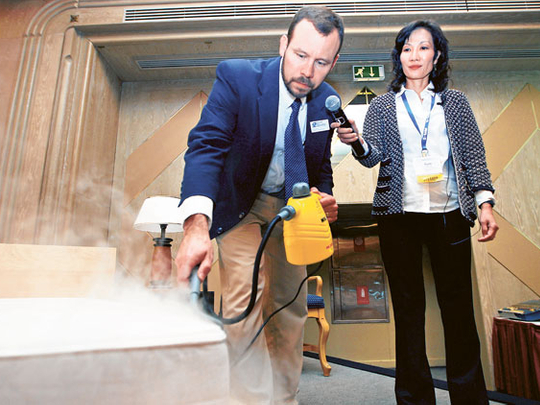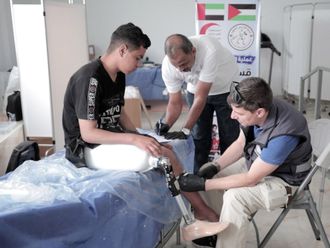
Dubai: Remember the time you saw a cockroach in your house and freaked out, only to realise it was not the only one to make itself at home? Remember the time you tried to kill a bed bug as soon as you spotted it but it vanished under the bed? Or the rodent who was smart enough to avoid the trap?
The many ways in which bugs and pests pester you is legion. Bed bugs, German cockroaches, ants and rodents are among the most common pests in this region. Effective and proper pest control therefore is crucial to get rid of these uninvited guests in your home. Apart from the fact that they are highly irritating to spot around your home, they also make your home unsafe and unhygienic to live in.
"This region, with its warm and humid climate, naturally attracts pests," says Hani Shehadeh, president of Ecovar. "It is not an uncontrollable situation and it can be managed. However, it is important to educate people on how to properly deal with pests," he says.
The problems with an infestation of bugs in a house could range from mere displeasure upon sighting one, to health hazards like skin problems and stomach upsets, etc. Sometimes bugs and pests could be potential carriers of diseases.
Says Fusail, a resident of Deira, "I moved to a new location and discovered the area had a lot of rats. The first time round, I noticed two in my apartment and they seemed to be feeding on everything - books, clothes… Now, we keep the gaps under the doors sealed and try to cover every possible opening in the house."
Infestation
Another resident, Marwin, says, "I did not take it seriously when I first spotted a bed bug or two in my house. But soon they were everywhere. I started killing them the moment I spotted one but it did not help. Using sprays brought no relief either until one day I had to throw away my sofa set and bed, which were totally infested."
Dinesh Ramachandran from the National Pest Control says they receive the maximum number of calls for help to eliminate bed bugs.
‘‘For the last four to five years, the number of requests for treatments of bedbugs has almost quadrupled," he says. Even though beg bugs are not carriers of diseases, their infestation can get out of control and experts recommend professional pest management in such cases.
Contamination
According to the US National Pest Management Association International, rodents consume or contaminate about 20 per cent of the world's food supply. They carry fleas and ticks that could be carriers of diseases like rat bite fever, salmonella, trichinosis, murine typhus, the plague, and leptospirosis. Rodents have also been implicated in fires across the country by chewing wires and spilling flammables.
Seven to eight per cent of the population is allergic to cockroaches, according to recent surveys, which have also determined that cockroach allergens are the No 3 contributors to children's asthma in the world. Cockroaches are known to spread 33 kinds of bacteria and six kinds of parasitic worms.
Sanitation and exclusion are keys to controlling pests. The three main invitees of pests are food, water and harborage, according to experts.
Storage areas
"We should eliminate food sources which can invite pests," says Dr Faith M. Oi from the University of Florida. "For instance, many times people just leave food items open on tables and shelves. Sometimes, after a meal, we leave the leftovers in the dishes in the sink. Even pet food kept out and left uncovered is enough to attract pests.
Other unattended issues, for example, are excess water pooling after a car wash. "People wash their cars and do not clear the area of stagnant water. Mosquitoes hurry to these pools of water to lay eggs. Open water tanks are also breeding grounds for mosquitoes," says Dr Faith.
Rodents, most of the tims, are attracted to enter houses through cracks in the doors, into neglected storage areas, unattended containers, etc.
"A rat will need only 7mm of space to enter your house," says Dr Faith. "So if you live in an area where there is a possibility of rats entering your house, you need to make sure the gaps under the doors are taken care of. And rats feed on just about anything, which makes it all the more important to keep your home or workplace clutter-free and ensure that food and other items are properly stored."
The issue with bed bugs however is different as they can be transported very easily via furniture, towels, personal clothing, luggage, even your laundry.
"A close inspection of your living spaces is important," says Dr Faith. "For instance, if you go to a hotel room, the places you should be checking thoroughly are the bed, the headboard, cracks and crevices and also where the carpet meets the wall," she says.
Seek professional help
According to experts, sprays and chemicals available in the supermarket may not be very effective. They work at a very minimum level. If there is an infestation, you need to get professional help.
"Attempts to control the situation yourself could also be dangerous," says Shehadeh.
"You are dealing with chemicals. For instance, you used a spray and then forgot to clean the surfaces in your kitchen. It's very possible that kids could drop a food item to the floor, pick it up and put it in their mouth. It could even happen that you forgot to properly cover your food while using the spray. Or, that you inhaled it while spraying. You should not take such situations for granted. Be careful while attempting to use them," he says.
For rodents and bed bugs in particular, professional help is a must. "There is no quick-fix solution," says Ramachandran.
"Several treatments would be needed to rid your home of bed bugs. Regular follow-ups are important. Ideally, you should go in for an annual contract. In that case, you ensure follow-ups and the pest control will also make sure that the problem is eradicated."













